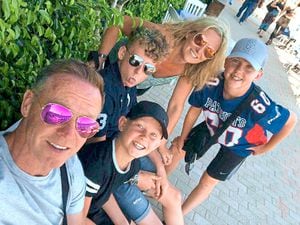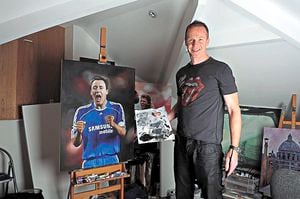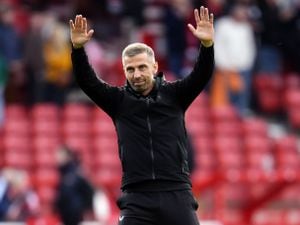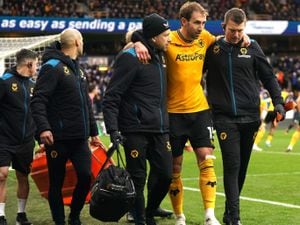Never forgotten, Jody Craddock's little boy Jake would have turned 18 today
This evening, the Craddock family will gather around the table for dinner as they always do at their home in the village of Cookley between Wolverhampton and Kidderminster...writes Paul Berry.
Only this time, as on March 25th of every year, there will also be a birthday cake in memory of a member of the family who will never, ever be forgotten.
Today would have heralded the 18th birthday of Jake Craddock, the son that Jody and wife Shelley tragically lost to cot death in August of 2002.
And so, at the dinner table, Jody, Shelley, and their three boys Joseph, 15, Luke, 13, and Toby, 10, will take a moment to remember.
“Jake is still a massive part of our lives, and he always will be,” says Craddock.
“We chat about him and we look back at photos.
“I’ve never been massive for social media in terms of personal life and family and mainly use it to try and promote my artwork.
“But when it gets to this time of year and Jake’s birthday, I will always remember him and put out a photo.
“It’s just our way of saying, ‘you haven’t been forgotten and never will be,’ and ‘you will always be with us.’”
For a parent, to lose a child in such devastating circumstances must be unimaginable.
Craddock was five years into his Sunderland career having previously joined the club from Cambridge, and so he and Shelley were up on Wearside and geographically well away from family when tragedy struck.
They did of course have incredible support from family and friends, and from Sunderland, but above all else had to rely on each other, Shelley regularly going in to Jody’s training sessions just to be close to him as he tried to somehow return to normal life.
Just how did they manage to cope with such a dreadful event which continues to affect over 200 babies - and sets of parents - every year?
“You just have to get through it don’t you?” says Craddock.
“It was devastating, really devastating, but we could either fall apart and crumble or try and deal with it however we could and come out the other side.
“And do you know what? Even with our devastation, there were always people in worse positions than we were.

“Jake’s passing was around the time that those poor young girls were murdered (in Soham), and I remember thinking how terrible it must have been for their parents.
“I think both me and Shelley are people who just try and get through things when they happen, however bad they are, and I truly believe it made us stronger.
“Stronger as individuals, stronger as a couple, and stronger now as a family.
“I think we enjoy things a lot more now than we might have done, and we appreciate everything about life so much more.”
The support from Sunderland as a club, and supporters, at the time is something that has also never been forgotten.
The summer following Jake’s death saw Craddock move to Wolves, newly promoted to the Premier League, and, after immediate relegation, his first return to the Stadium of Light came in November, 2004, just after Dave Jones had been sacked.
Craddock was a substitute and didn’t even get on the pitch as Wolves were beaten 3-1, but, the first time he warmed up, the home support rose as one to applaud and show their warmth for a defender for whom they had the utmost respect.
“They were brilliant to us up in Sunderland,” Craddock recalls.
“Such great fans, very similar to Wolves, and we will never forget how they were to us in such dreadful times.
“Even when I played against them with Wolves, they were fantastic, and so many of them travelled down that long old distance for my testimonial which I will always appreciate.”
It feels almost inappropriate to compare a devastating personal loss with what is, after all, only a game of football, but it is certain that Craddock’s considerable personal qualities – and Shelley’s support – which helped them through the worst moments in life have also underpinned his footballing success story.
Right the way through from non-league with Christchurch, to the Premier League.
Matt Murray tells of being on an exercise bike at Wolves’ gym and asking Craddock, then nearing the end of his career, how he would feel about retirement.
“He told me that when it came, he would know that he had given everything he possibly could to his career, and reached the highest level he possibly could,” says Murray.
“For anyone, in any career, what a thing to be able to walk away knowing you had been the very best you could be.”
Craddock explains: “I had to work really hard to get to where I did, and it was all down to pure hard work.
“I had a fantastic career, and I loved every minute of it, but I knew I was never going to get right to the very top of the game.
“I did as much as I could, and worked as hard as I could from getting the break in lower league with Cambridge and going on to play eight seasons in the Premier League.
“I really couldn’t have done any more.”
Coupled with that attitude came an approach to each and every game of complete and unswerving focus.
Mick McCarthy regularly referred to Craddock as a player who ‘did everything it said on the tin’ which might, on the face of it, sound disparaging.
Far from it.
It was in fact a lofty compliment, McCarthy highlighting the man he made his Wolves captain as a player in his own mould, one he could rely on, and one who would always bounce back.
There were many summer transfer windows when a new central defender would arrive to lay claim to Craddock’s place – and would never quite manage it – and even when he was sent on loan to Stoke with his Molineux days seemingly numbered, he returned and went on to play arguably the best football of his career.
Friendly, engaging, affable off the pitch, Craddock was a hard-nosed and fierce competitor on it, as many strikers discovered to their cost, as well as Wolves physios, who were regularly called upon to patch up the defender’s war wounds.
“I would always get myself really hyped up and ready for a game,” he recalls.
“I would get to the stage where I feel I could run through a brick wall and it wouldn’t even hurt – that is what playing football felt like for me.
“Out on that pitch, I would do everything I possibly could within my power to stop that ball going in the back of our net.
“If that meant sticking my head in front of it, and getting a kick to the face, I would do it.
“Maybe it was the adrenalin but I don’t think I ever felt the pain.
“Well I broke my foot and that hurt, and did my hamstring as well, but the other stuff, getting my head split open, I never felt it.
“The amount of times I would say to the physio, ‘don’t inject it or numb it, just stitch it up and let me get back out there’.
“That was it, that was what I wanted to do, all for the love of the game.
“And I’ll tell you something else, I used to love the big derbies.
“I was never great at remembering too many particular games or highlights but I always remembered the derbies.
“Cambridge against Peterborough, Sunderland against Newcastle, and of course, Wolves against West Brom.

“I just knew how much it meant to fans, and, from the first day of build-up in the week, I was in ‘derby mode’.
“Everything about training just seemed to go up a level, and I felt that added meaning just like the fans with a lot of nervous energy, which I would then put to good use once we got out on the pitch.”
Five-hundred-and-eighty-one career appearances for five clubs spanning 18 years, almost half of which were spent in the Premier League, 24 goals, two Championship titles, Wolves Player of the Year for the 2009/10 campaign after returning to the top level.
Impressive statistics by any standards, and little wonder that over 9,000 Wolves and Sunderland fans turned out at Molineux to enjoy a star-studded turnout at Craddock’s testimonial at the celebratory end to Wolves’ League One winning season of 2013/14.
Part of the proceeds from the testimonial were donated to Birmingham Children’s Hospital, because, by this point, the Craddock’s youngest son Toby had been diagnosed with leukaemia at the age of just two-and-a-half.
After losing Jake, Jody and Shelley would surely have been entitled to feel a sense of anger and bitterness to have to go through such another challenging ordeal but, once again, they remained positive.
“It is obviously again terrible when something like this happens to your child, especially cancer, and I didn’t even know what leukaemia was,” says Craddock.
“But my god, we were so lucky that the treatment had an excellent success rate for the strain of leukaemia that Toby was diagnosed with.
“From the very start, we looked at it positively, and Toby was brilliant.
“He was able to come through all the treatment and it is great to see him as strong and healthy as he is now.”
That testimonial may have followed the official finale of Craddock’s professional football career, but his interest in the sport has continued.
As a player, he tended to stay away from watching other games to get a break from the game, but now, up until the coronavirus outbreak, admitted: “I was watching more football than ever!”
The former skipper is enjoying the dramatic progress made by Wolves in recent seasons, saluting the achievements of Nuno Espirito Santo in building such a successful squad.
A key figure in Wolves’ previous Championship promotion, Craddock was the voice of experience in that title-winning 2008/09 season, especially during the run-in, and commanded huge respect from management and team-mates.
Although one of the quieter influences amongst a very young and lively group, he was also more than willing to get involved in the usual dressing room exchanges – and his fancy dress outfits for the players’ Christmas parties remain the stuff of legend.
All three of Craddock’s sons now play for junior football teams – usually totalling five games a weekend – and his involvement in the game remains in coaching three of them.
That unstoppable will to win, even from the sidelines, has not diminished.
“I know it’s all about the kids enjoying it, and doing the right things, but, deep down, I am always thinking, ‘I really want to win!’” he acknowledges.
“If we win a game or nick a goal at the end to get a result I still get that buzz, even though it is not me out on the pitch and directly involved.”
Coaching is his hobby, but Craddock’s main career now is as an artist, which also began as an interest having taken the subject at A-level and then, when able to purchase more advanced materials whilst at Sunderland, developed further.
Art fairs and exhibitions have become a regular feature of the Craddock calendar, promoting his varied repertoire, which has also included many football-based commissions and a season of penning the programme covers for Wolves.
His portfolio of statue-based paintings are spectacular, whilst his versatility and desire to ‘mix it up’ has seen an involvement in many other projects, including a range of mini-figures.
And the thrill now? Not scoring a goal, or making a last-ditch tackle, just making a sale on one of his works,
“I could not have asked for better second job after football,” says Craddock.
“Football was great, and without it I probably wouldn’t have been able to go on and do this now, but to be able to work from home, sitting in front of an easel, there is nothing better.
“Like with the football, I worked hard and pushed and pushed to try and get better as an artist, and managed to get myself to a situation where I am now where I can paint pretty much anything, which is a nice feeling.
“I wouldn’t say I get nervous before going to show my work at an exhibition but it’s more a feeling of just hoping somebody wants to buy something!
“I work so hard and take so much time on every painting, and at an art fair or exhibition you can be alongside hundreds of other artists.
“It is an incredible feeling when someone comes in and chooses your work alongside those other great artists, and means so much.
“I sold a painting only last week, before social distancing came in, to a guy who had bought it for his brother, and his brother actually cried when he saw it for the first time.
“It was for the right reasons – he loved it! – and that is such an incredible feeling for an artist when you have put so much into a piece of work.
“That’s always the reaction you are looking for, to know someone appreciates what you have done, in just the same way as if a Wolves fan comes up and tells me that they really enjoyed what I did at the club and the effort I put in.
“I always want to be remembered as someone who gave everything he had whether it’s in football or art, and it’s always amazing to know that Wolves fans don’t forget.”
Craddock remains touched by the support he received from Wolves fans both on and off the pitch, his performances having won them over to the extent that they penned THAT song – which can’t really be repeated here – but is one he takes as a compliment.
He still turns out for the Wolves Allstars team when he can, and remains in touch with many of his former Molineux team-mates, but it is clear now where his overall priorities lie.
“Family life means everything to me and Shelley, and that is why I never tried to go into coaching,” he explains.
“To not be around for Christmas, school holidays, everything I had to miss out on as a player, I worked so hard to be able to spend more time with my family now.
“Time goes so fast, and the kids grow up so quickly, and my eldest Joseph, who has got involved in doing some art himself, was due to have taken his GCSE’s in May.
“Before we know it they will all have grown up and moved out so we want to make the most of the family time while we can.
“We have dinner together around the table every evening, we go on holidays and do so many other activities together, and that is so important.
“It is more important for me than had I gone on to become a football coach, and wouldn’t have been able to do it.”
How then do we sum up the careers of Jody Craddock? Premier League footballer. Accomplished selling artist. Junior football coach. Community activist as well, having joined the campaign to protest against plans to build a sand and mineral quarry at Lea Castle Farm.
Yes, all of those. But above all else, a husband and a Dad.
Author and journalist Paul Berry will be writing a series of features for the Express & Star looking back at the golden memories through Wolves' history.





